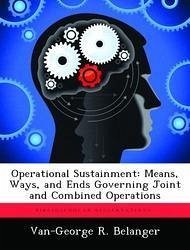This monograph examines the impact operational sustainment has on mid-high intensity operations in a semi-austere theater of operations. The analysis begins with the theory of sustaining operations at the operational level of war and the principles of current sustainment doctrine. A paradigm is developed for examining sustainment as an essential and critical part of operational art. In the paradigm, operational sustainment is defined as taking the logistical means available and applying them in a particular way while minimizing risk to achieve desired ends. Logistics (personnel, material, transportation, facilities, and services) define the operational sustainment means used in this analysis. Logistics are applied using the sustainment activities of lines of support, staging, altering lines of communications, prioritizing, and force expansion as the sustainment ways. It is proposed that risk can be minimized by adhering to the sustainment imperatives of anticipation, integration, continuity, responsiveness, and improvisation. The Sixth Army campaign on Luzon during World War II is analyzed using the operational sustainment paradigm to evaluate the impact of sustainment at the operational level of war. The monograph concludes that operational sustainment is the predominant factor when planning and conducting joint and combined operations and that the operational sustainment paradigm is a useful model for examining campaigns and major operations from a sustainment point of view.
Hinweis: Dieser Artikel kann nur an eine deutsche Lieferadresse ausgeliefert werden.
Hinweis: Dieser Artikel kann nur an eine deutsche Lieferadresse ausgeliefert werden.








